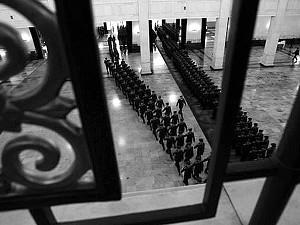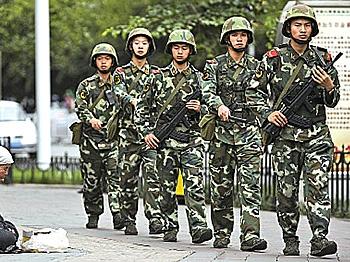On August 30, China confirmed that Jin Renqing, minister of Finance, resigned because of “personal reasons”. However, some insiders in Beijing said that Jin Renqing is under investigation and his case involves five or six other ministers.
There are three versions of the story: in one version he was forced out because he had a mistress; in another version he was allocating funds to persecute Falun Gong, and the recent version in which he was guilty of “leaking secrets about Chinese Premier Wen Jiabao being tired of work”.
Authorities have never formally responded to these three versions. The version which is closest to the truth involves Jin Renqing privately allocating funds in the amount of trillions of yuan for Jiang Zemin to persecute Falun Gong, and that Chinese President Hu Jintao and Chinese Premier Wen Jiabao are investigating the case.
China’s ex-President Jiang Zemin and Zeng Qinghong, a member of Jiang’s “Shanghai Gang”, are trying to hide this version. Jiang and Zeng seem to be promoting the first and the third version of the story. We can see that high-level Chinese Communist Party officials are fighting over the issue of Falun Gong.
Huge Amount of Funds Used to Suppress Falun Gong
Insiders revealed that Jiang Zemin hadn’t thought the persecution of Falun Gong would be that expensive when he started it in 1999. He thought that Falun Gong would not be able to withstand even a single blow and it would disappear in China within half a year. Because of this, the expenses for his newly formed 610 Office were coming from the daily expense account of the Central Committee of the CCP.
As more 610 offices, brainwashing classes and transformation camps, new labor camps, new prisons, new cellblocks in old prisons were set up to house Falun Gong practitioners, the amount of money needed to sustain the persecution also grew. In addition to these expenses, there were the salaries for secret agents overseas. Moreover, some of the funds were taken by corrupt local officials at all levels. All of these caused the cost of the suppression to rise tremendously.
At the beginning of 2000, Jiang started transferring (borrowing) funds from some ministries, armies units and some provinces. However, the suppression could no longer continue by the end of 2002. At the beginning of 2003 everyone who loaned money began demanding repayment from the central 610 Office. Nobody knows exactly how much money Jiang spent during the first four years of the persecution. Some think it had to be at least in the trillions.
In addition, travel expenses for police stations and Public Security officers who had to travel collect Falun Gong practitioners who had been arrested in different cities were all covered by all local financial departments, and costs of worldwide activities against Falun Gong were covered by Chinese Embassies. All this money was taken out of the country’s income taxes, and all of it had been budgeted for other programs.
Jin Secretly Transferred Funds to Support the Persecution of Falun Gong
Shortly after Jin Renqing was named Minister of Finance in June 2003, he began allocating funds through unknown channels for Jiang Zemin to repay the money borrowed by the “610 Office”. Without Jiang’s approval, it is hard to imagine how Jin could have transferred trillions of yuan without leaving a paper trail, unless he had Jiang’s approval.
Analysts point out that the procedure used for the fund transfers were an illegal black-box trick because it was approved neither by the Political Bureau of the Central Committee nor by the State Council. Recently, sources confirmed that Hu Jintao and Wen Jiabao are secretly making a thorough investigation how funds were handled since Jiang launched the campaign against Falun Gong. Hu and Wen do not want to take the blame for Jiang on this issue. It is thus obvious that this thorough investigation of these financial transactions puts Jiang in a perilous position.
The Other Versions: Mistress and Leaking Secrets—Full of Contradictions and Flaws
The version about Jin having a mistress is a hot topic, but it does not make sense. For those familiar with the CCP’s official circles, it goes against their own rules to have so many high-ranking officers involved in a panic only because of a “mistress” or “taking bribes”. These are considered to be common behaviors in those circles.
Feeling the pressure because of the weakness of the first story, some sources within the CCP hurriedly spread another version, saying “Jin Renqing resigned because he disclosed Wen Jiabao’s intention to step down.”
Recently, a report by the Information Center for Human Rights and Democracy said that during a private gathering on May 20, Jin Renqing talked about his tiring of work as the Minister of Finance, Wen Jiabao’s intention to leave office, and the condition of Huang Ju, recently deceased Vice Premier and a member of the Standing Committee of the Political Bureau. His remarks were supposed to have spread quickly among financial circles. In June, the Kyodo News Agency published a report titled Wen Jiabao Wants to Resign, which lead to protests from China’s Foreign Ministry.
Analysts do not exclude the possibility of a trick by Jiang Zemin and his crony Zeng Qinghong to deliberately leak information about Wen Jiabao, as Jiang and Zeng aimed at concealing the secret allocation of funds used for the persecution.
It seems that the tussle behind Jin’s case is one factor affecting China’s 17th National People’s Congress.





Friends Read Free